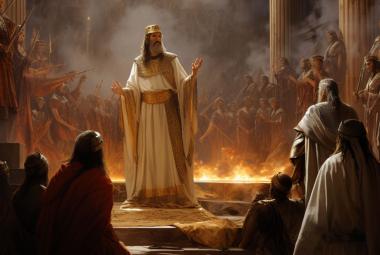April is the month which includes, this year, the first three of the seven Feasts of Moses. The seven feasts instituted in the Torah are not only historically commemorative, they also have a prophetic role.1 The first three are in the first month, Nisan, and speak of Jesus' first coming; the last three are in the seventh month, Tishri, and point to His second coming; and the one in between, the Feast of Shavout (Pentecost), anticipates the Church.2
Gabriel's "Bull's Eye"
On the 10th of Nisan, one of the most amazing prophecies in the Bible was fulfilled. We celebrate it as the Triumphal Entry. (Palm Sunday is on the 9th of April this year, which happens to be the 9th of Nisan.) The angel Gabriel gave Daniel a precise mathematical prophecy which predicted, five centuries in advance, the very day that Jesus would present Himself as the Meshiach Nagid, the Messiah the King.3
Passover
This year the 14th of April, Good Friday, also happens to be the 14th of Nisan, Passover. When Jesus was first introduced publicly by John the Baptist, He was announced as "The Lamb of God."4 Paul also identifies Jesus as "our passover."5 Jesus was, indeed, offered as our Passover lamb on the very day of Passover, the 14th of Nisan. Careful study of this celebration will reveal that every detail points to Jesus' offering of Himself on the cross!
The Feast of Unleavened Bread
The 15th of Nisan began the seven-day Feast of Unleavened Bread.6 References to the first day, the 15th, which was a high sabbath, led to the confusion about the day of the crucifixion. (See our article on the crucifixion date in our Q & A section.)
The Feast of First Fruits
The Feast of First Fruits, celebrated "on the morrow after the sabbath" (i.e., Sunday), was fulfilled by Jesus' resurrection as the first fruits.7 He had declared that He would be in the grave three days. It is interesting that the authorities, so anxious to get the body off the cross before sundown, unknowingly were fulfilling God's predetermined plan.8
Noah's flood ended on the 17th day of the 7th month.9 This month becomes the first month at the institution of the Passover.10 Our new beginning in Christ was on the anniversary of the Earth's "new beginning" under Noah!
Israel's new beginning, the crossing of the Red Sea, is believed to have been on the 17th of Nisan. Also, in their flight after Passover, Israel retrieved the body of Joseph from his tomb. After Passover, Jesus was retrieved rom another Joseph's tomb on this date.
An Unknown Conversation
You may remember that Joseph of Arimathea requested the body of Jesus from Pilate. Joseph had to be extremely wealthy and influential to be able to approach Pilate personally. We also understand from Roman law that he had to be the next of kin to receive the body.
Chuck Smith shared with me a little-known detail of that historic conversation:
Pilate was surprised at Joseph's request. "I don't under stand, Joseph. You are one of the richest men in the region, and you have just completed this new tomb for your family. And now you're going to use it to bury this criminal?"
"Why not? It's just for the weekend!" Joseph explained....
(I just couldn't resist sneaking in that apocryphal background.)
Truth in Labelling?
"Passover" is often used connotatively to allude to the season embracing all three of these feasts occurring in Nisan, the first month of the Hebrew religious calendar. Isn't it tragic that we refer to this season by its pagan name, Easter, after the Babylonian goddess, Ishtar (also, Astarte). It was the pagan preoccupation with fertility that linked the prolificacy of rabbits with the golden egg of Astarte, etc. Have you ever wondered how we got Easter bunnies that lay eggs?
For a detailed review of the prophetic significance of the feasts of the Torah, see The Feasts of Israel. (Also see From Here to Eternity, a study of the resurrection, the rapture, and the physics of immortality.)
Notes:
- Colossians 2:16,17.
- These are detailed in the Briefing Package, The Feasts of Israel, p. 16.
- Prophecy is Daniel 9:24-25. Fulfillment is in Luke 19:28-44. See also Daniel's 70 Weeks, Briefing Package, p. 16.
- John 1:29, 36.
- 1 Corinthians 5:7.
- Leviticus 23:6-8; cf. John 6:32-35, 47-51; 2 Corinthians 5:21; 1 Corinthians 5:6-8; Galations 5:7-9.
- Leviticus 23:10-14. Fulfillment: 1 Corinthians 15:20-23; Matthew 27:52-53; Ephesians 1:6; Romans 11:16. Application: Galations 2:20; Romans 6:11-14; James 1:18.
- See The Feasts of Israel Audio Book.
- Genesis 8:4.
- Exodus 12:2.







